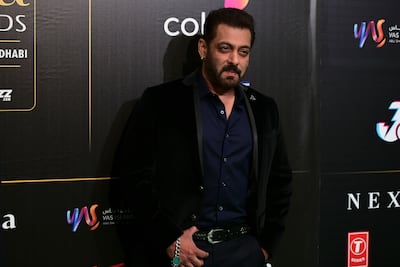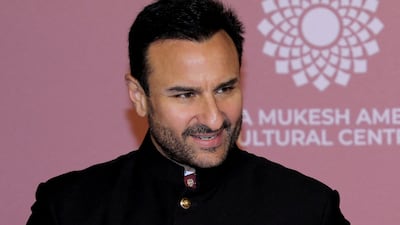The knife attack on actor Saif Ali Khan at his Mumbai home this week has reignited concern about the threats faced by Bollywood stars in the city.
Mumbai, still referred to as Bombay by many around the globe, is home to the nation’s billionaires, celebrated cricketers and beloved Bollywood celebrities, idolised by legions of fans. The city had been gradually shedding its shadowy reputation as India’s crime capital, but is now in the spotlight for the wrong reasons.
Khan, 54, one of Bollywood’s most prominent stars, was stabbed six times on Thursday after he confronted an armed intruder at his palatial apartment in Mumbai’s posh Bandra neighbourhood, according to officials.
He was rushed to the hospital by his eldest son, Ibrahim Ali Khan – an upcoming actor – on a tuk-tuk, while the knife remained lodged in his spine, police said.
After undergoing surgery for spinal cord injuries, doctors declared him out of danger. As he recovers in hospital, the shocking incident has revived haunting memories of the criminal and extortion gangs that plagued the city until two decades ago.
In their preliminary investigation, police said the intruder entered Khan’s home via the stairs intending to commit theft and then fled the scene using the fire escape.
Industry veterans believe the timing of the attack has heightened concern about the safety of Bollywood actors, who have long faced death threats and attacks from crime syndicates.

Last July, police arrested six people for their involvement in a shooting and a plot to assassinate superstar Salman Khan at his home in Bandra, in the same area where Saif Ali Khan lives.
The government has since provided Salman Khan with round-the-clock security and the actor’s house was recently fortified with bulletproof glass.
“The real takeaway from all of this is that as Saif recovers and Salman puts bulletproof glass on the windows of his Bandra apartment, the fame and influence that insulated powerful people from frightening activities for many years seems to be dwindling,” Raja Sen, a Mumbai-based film critic, tells The National.
“Famous people, who were earlier assumed to be out of reach, and who could not be targeted, are being victimised,” he adds.
Salman Khan has faced death threats from Lawrence Bishnoi, a jailed gangster, over the hunting of blackbuck, an endangered deer considered sacred by the Bishnoi community, in 1998. The star was convicted and sentenced to five years in prison for killing two of the deer but is currently out on bail.

Saif Ali Khan's attack follows the murder of his close aide, politician Baba Siddiqui, by the Bishnoi gang in Mumbai in October. Bishnoi is also accused by Delhi Police of masterminding the killing of popular Punjabi singer Sidhu Moose Wala, in 2022.
Savita Raj Hiremath, a veteran film producer, says the Saif Ali Khan incident has sparked insecurity fears, not only among the film fraternity but also the public.
“Famous people are being targeted,” Hiremath tells The National. “The whole of Bombay is talking about the incident. How can one enter somebody’s bedroom? It is very scary. The incident has created fear and shaken many today.”
Bollywood actors are no strangers to threats. Actors such as Shah Rukh Khan, Preity Zinta, Govinda and Akshay Kumar have received threats and extortion demands from criminal syndicates, with many producers and directors also targeted.

The late Gulshan Kumar, who founded T-Series, one of the leading music labels and film production companies, was killed in Mumbai in 1997. Abdul Rauf, a close aide of Dawood Ibrahim, a notorious gang leader from Mumbai, was convicted for Kumar's murder in 2022 and sentenced to life in prison.
Actor and director Rakesh Roshan, the father of Bollywood star Hrithik Roshan, also survived an assassination attempt in 2000 over extortion demands.
However, unlike in previous decades when criminals targeted celebrities to gain notoriety, targeting either by gangs or motivated groups is increasingly driven by a complex mix of religion and nationalism.
Saif Ali Khan, who comes from a prominent royal family, has appeared in nearly 70 Bollywood films and has bagged multiple awards for his performances. But he has also faced criticism from Hindu nationalists over his marriage to Kareena Kapoor, a leading Bollywood actress, who is Hindu. The couple have also faced further ire over naming their son Taimur. Some groups claim the name is associated with a medieval Muslim conqueror blamed for persecuting Hindus, and an attempt to deliberately affront Hindu sensibilities.

In recent years, India’s polarised political environment has had a profound impact on the film industry, with social media often raging with calls of #BoycottBollywood and actors routinely criticised and threatened for their political and religious beliefs as well as the characters they play.
Shifting public opinion about the industry has not just robbed Bollywood stars of their divinity, but has increasingly exposed them to dangers never seen before.
“In 90s Bollywood, the influence from the underworld on movies, producers and how they exerted that, as well as the killing of Gulshan Kumar, were horrific,” Sen says. “Now, when the film industry is not doing well, these attacks further weaken the momentum and spirit of the filmmaking community.”




